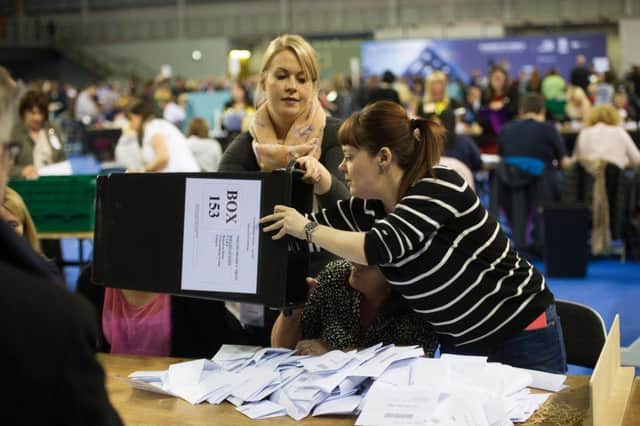What can council elections tell us about the national picture?


This time, we will elect the many hundreds of councillors who are given the glamorous task of overseeing things like bin collection and park management.
The important issues that councillors are responsible for are often sidelined during the campaigns to elect them to office.
Advertisement
Hide AdAdvertisement
Hide AdThis year has been no different, with the elections to Scotland’s 32 local authorities being rather overshadowed by the constitutional issues of the day.
Brexit and Independence look set to continue to cast a long shadow over most aspects of political life, and this vote is no different.
But with yet another election looming, what could the council elections tell us about the state of Scottish politics?
Indyref2
The prospect of another referendum has dominated the political landscape since Brexit, and arguably immediately after the last referendum on our constitutional future.
Ruth Davidson and her Scottish Conservative Party, who have been enjoying something of a revival in the last year, will hope to be the second largest party in terms of Scottish councillors.
Her party has made opposition to another vote on independence their key (some would unkindly argue only) policy at both upcoming elections.
They want voters to send a message to Nicola Sturgeon by electing as many Tory Councillors across the country as possible.
What influence a local councillor, no matter the party, can have on whether or not Scotland has another referendum isn’t clear, but it is the force in numbers that the Tories believe will cause Nicola Sturgeon to back down on her demands.
Labour’s destruction complete
Advertisement
Hide AdAdvertisement
Hide AdOne of the most prominent national political issues that will most likely be underscored by the results of today’s election, is the decline of
Once the most dominant force in Scottish politics, once even the only real force in Scottish politics, Labour have been consistently thrashed at all manner of elections.
They belied this recent terrible form by holding up their vote at the council elections of 2012, when they came just behind the SNP in terms of number of councillors elected.
The party also denied the SNP their main prize of taking control of Glasgow City Council, which Labour have controlled for decades.
It seems unlikely that such a feat will be repeated once the votes are counted tomorrow at the Emirates Arena in the city’s East End.
The SNP have made taking control of Glasgow City Council once again their number one priority, with Nicola Sturgeon taking a personal hand in the campaign.
While there is some thinking that Ms Sturgeon’s party may have to do a deal with other parties to take control, others are more bullish.
SNP sources concede that their internal target is higher than the 42 required to take overall majority control of the council.
Advertisement
Hide AdAdvertisement
Hide AdLabour could also lose enough councillors to come second nationally behind the Conservatives, a repeat of the indignity that Kezia Dugdale’s party suffered at the Holyrood elections last year.
A change of strategy?
Politicians will of course focus ward-by-ward, and council-by-council as far as establishing where they stand with the electorate.
But there will be a certain amount of poring over the national picture to see what changes, if any, need to be made ahead of the general election vote next month.
If the Tories struggle to make in-roads in areas where they have been previously strong, could they scale back their efforts to take up to as many as 10 seats from the SNP?
The SNP could perhaps soften their tone on the upcoming election being a vote on the second referendum if the Tories anti-independence strategy yields results for Ruth Davidson’s party.
Mostly, the changes made after the council elections will go unseen by all but party workers, politicians, and the journalists who cover them.
Subtle changes to messaging, tweaks in voter ID procedures, even what questions are asked on the doorsteps are all part of a lesson parties could learn from today.
Either way, the election fatigue isn’t going away any time soon.
